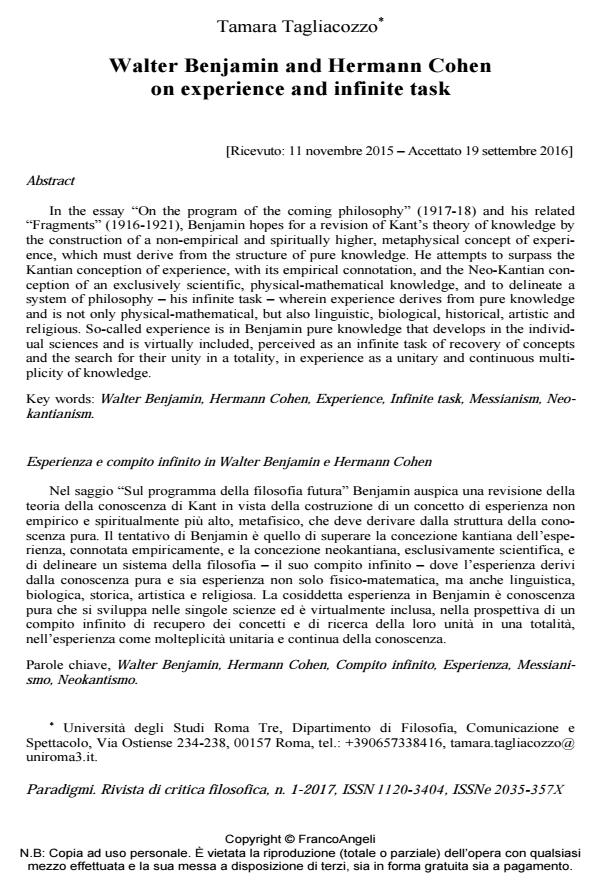Walter Benjamin and Hermann Cohen on experience and infinite task
Titolo Rivista PARADIGMI
Autori/Curatori Tamara Tagliacozzo
Anno di pubblicazione 2017 Fascicolo 2017/1
Lingua Inglese Numero pagine 18 P. 79-96 Dimensione file 291 KB
DOI 10.3280/PARA2017-001006
Il DOI è il codice a barre della proprietà intellettuale: per saperne di più
clicca qui
Qui sotto puoi vedere in anteprima la prima pagina di questo articolo.
Se questo articolo ti interessa, lo puoi acquistare (e scaricare in formato pdf) seguendo le facili indicazioni per acquistare il download credit. Acquista Download Credits per scaricare questo Articolo in formato PDF

FrancoAngeli è membro della Publishers International Linking Association, Inc (PILA)associazione indipendente e non profit per facilitare (attraverso i servizi tecnologici implementati da CrossRef.org) l’accesso degli studiosi ai contenuti digitali nelle pubblicazioni professionali e scientifiche
In the essay "On the program of the coming philosophy" (1917-18) and his related "Fragments" (1916-1921), Benjamin hopes for a revision of Kant’s theory of knowledge by the construction of a non-empirical and spiritually higher, metaphysical concept of experience, which must derive from the structure of pure knowledge. He attempts to surpass the Kantian conception of experience, with its empirical connotation, and the Neo-Kantian conception of an exclusively scientific, physical-mathematical knowledge, and to delineate a system of philosophy - his infinite task - wherein experience derives from pure knowledge and is not only physical-mathematical, but also linguistic, biological, historical, artistic and religious. So-called experience is in Benjamin pure knowledge that develops in the individual sciences and is virtually included, perceived as an infinite task of recovery of concepts and the search for their unity in a totality, in experience as a unitary and continuous multiplicity of knowledge.
Nel saggio "Sul programma della filosofia futura" Benjamin auspica una revisione della teoria della conoscenza di Kant in vista della costruzione di un concetto di esperienza non empirico e spiritualmente più alto, metafisico, che deve derivare dalla struttura della conoscenza pura. Il tentativo di Benjamin è quello di superare la concezione kantiana dell’espe¬rienza, connotata empiricamente, e la concezione neokantiana, esclusivamente scientifica, e di delineare un sistema della filosofia - il suo compito infinito - dove l’esperienza derivi dalla conoscenza pura e sia esperienza non solo fisico-matematica, ma anche linguistica, biologica, storica, artistica e religiosa. La cosiddetta esperienza in Benjamin è conoscenza pura che si sviluppa nelle singole scienze ed è virtualmente inclusa, nella prospettiva di un compito infinito di recupero dei concetti e di ricerca della loro unità in una totalità, nell’esperienza come molteplicità unitaria e continua della conoscenza.
Parole chiave:Walter Benjamin, Hermann Cohen, Compito infinito, Esperienza, Messianismo, Neokantismo.
Tamara Tagliacozzo, Walter Benjamin and Hermann Cohen on experience and infinite task in "PARADIGMI" 1/2017, pp 79-96, DOI: 10.3280/PARA2017-001006